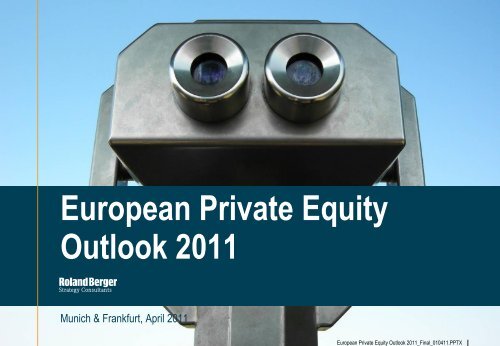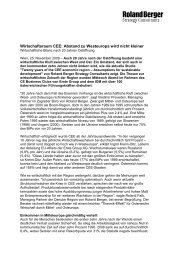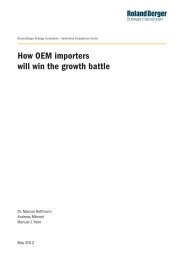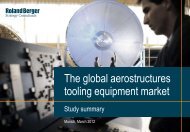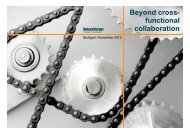You also want an ePaper? Increase the reach of your titles
YUMPU automatically turns print PDFs into web optimized ePapers that Google loves.
<strong>European</strong> <strong>Private</strong> <strong>Equity</strong><br />
<strong>Outlook</strong> <strong>2011</strong><br />
Munich & Frankfurt, April <strong>2011</strong><br />
<strong>European</strong> <strong>Private</strong> <strong>Equity</strong> <strong>Outlook</strong> <strong>2011</strong>_Final_010411.PPTX
Contents Page<br />
A. The current private equity environment<br />
En route to recovery 6<br />
B. A look at the <strong>European</strong> real economy<br />
In and out of turmoil – and back again? 11<br />
C. A look at capital markets<br />
No full recovery yet 18<br />
D. <strong>Outlook</strong> <strong>2011</strong> and beyond<br />
Situation improved, but complexities ahead 27<br />
© 2010 Roland Berger Strategy Consultants GmbH<br />
<strong>European</strong> <strong>Private</strong> <strong>Equity</strong> <strong>Outlook</strong> <strong>2011</strong>_Final_010411.PPTX<br />
2
While PE regains momentum after a disastrous year 2009,<br />
market conditions presented substantial challenges in 2010<br />
Executive summary (1/3)<br />
> Situation 2010 – PE market regaining strength after downturn in 2009 but still challenging<br />
> In 2010, <strong>European</strong> PE activity is starting to regain momentum after a historical low in<br />
2009 – PE investments have increased by 52% compared to previous year<br />
> The <strong>European</strong> economy is starting to recover, but long-term prospects still uncertain<br />
> <strong>European</strong> governments fueled growth with deficit spending, which may hamper growth<br />
in the long run and put the stability of the <strong>European</strong> financial system at high risk<br />
> The capital markets environment has substantially improved but remains buoyed by<br />
concerns about the sustainability of economic recovery<br />
> Low loan availability and volatile markets limit acquisition and exit opportunities,<br />
leverage levels of around 3.5-4.0x EBITDA require high equity commitments in LBOs<br />
> Margins have recovered despite sovereign debt woes. Due to low base rates, overall<br />
loan and bond pricing is below bull market levels<br />
> With approx. EUR 173 bn in committed funds available, <strong>European</strong> general partners will<br />
have to rethink how they can meet limited partners' return expectations in the future<br />
<strong>European</strong> <strong>Private</strong> <strong>Equity</strong> <strong>Outlook</strong> <strong>2011</strong>_Final_010411.PPTX 3
<strong>Outlook</strong> for <strong>2011</strong> positive in a changing environment<br />
Executive summary (2/3)<br />
> <strong>Outlook</strong> <strong>2011</strong> – situation will improve with changes regarding type of investors, transactions<br />
and pricing<br />
– Expected increase in PE relevant M&A activity esp. in the Automotive, Capital goods,<br />
Business services and Consumer goods sectors<br />
– M&A activity from strategic buyers is likely to increase as the corporate agenda shifts<br />
from crisis to growth management. Also, we expect more activity from Asian buyers<br />
– Given the improvement in overall market conditions, we expect higher transaction<br />
security for sellers<br />
– As debt capital markets have yet to recover, large deals are likely to remain seldom<br />
– Revival of dual track PE exits, as investors aim to increase transaction security and<br />
leverage the window of opportunity in the stock market<br />
<strong>European</strong> <strong>Private</strong> <strong>Equity</strong> <strong>Outlook</strong> <strong>2011</strong>_Final_010411.PPTX 4
Challenges for the mid and long term perspective expected<br />
Executive summary (3/3)<br />
> Medium/long-term perspective – challenges in financing and redesign of business models<br />
expected<br />
– Refinancings become increasingly complex, driven by the restraint of debt providers<br />
– As value creation via pure financial engineering becomes more and more exhausted, we<br />
expect to see more business model innovation<br />
<strong>European</strong> <strong>Private</strong> <strong>Equity</strong> <strong>Outlook</strong> <strong>2011</strong>_Final_010411.PPTX 5
A. The current private equity environment<br />
En route to recovery<br />
<strong>European</strong> <strong>Private</strong> <strong>Equity</strong> <strong>Outlook</strong> <strong>2011</strong>_Final_010411.PPTX 6
PE investments are gaining momentum in 2010 – Rising<br />
valuation levels are crucial to recovery<br />
Current situation<br />
> In 2010, <strong>European</strong> PE activity is starting to regain momentum<br />
after a historical low in 2009<br />
> In 2010, EUR 36 bn were invested in Europe – a 52% increase<br />
year on year<br />
> With low deal volumes and average values, the M&A market is yet<br />
to recover – buyers' and sellers' price expectations in<br />
mismatch<br />
> With approx. EUR 173 bn in dry powder 1) available, general<br />
partners will have to rethink how they can meet limited partners'<br />
return expectations in the future<br />
> Also, PE funds must regain trust of their investors as fund<br />
performance has suffered during the financial crisis<br />
1) "Dry powder" refers to committed, yet uncalled funds of private equity funds<br />
Source: Roland Berger<br />
Return to sound<br />
valuation levels<br />
is key to the<br />
PE market's<br />
recovery<br />
<strong>European</strong> <strong>Private</strong> <strong>Equity</strong> <strong>Outlook</strong> <strong>2011</strong>_Final_010411.PPTX 7
While PE investments decreased by 57% in 2009, PE activity is<br />
starting to regain momentum in 2010<br />
<strong>European</strong> PE activity flows [EUR bn]<br />
Dry<br />
powder<br />
[EUR bn]<br />
27.0 29.1<br />
Funds raised<br />
Source: EVCA; Prequin<br />
60 67 104 141 178 191 194 173<br />
2003<br />
13.6<br />
36.9<br />
27.5<br />
Investments<br />
2004<br />
19.6<br />
71.8<br />
Divestments<br />
47.1<br />
2005<br />
29.8<br />
112.3<br />
71.2<br />
2006<br />
33.1<br />
82.9<br />
72.9<br />
2007<br />
27.6<br />
81.4<br />
54.0<br />
2008<br />
-57%<br />
2009<br />
+52%<br />
23.4<br />
14.0 16.1<br />
11.1<br />
15.3<br />
35.6<br />
2010<br />
11.7<br />
<strong>European</strong> <strong>Private</strong> <strong>Equity</strong> <strong>Outlook</strong> <strong>2011</strong>_Final_010411.PPTX 8
M&A volumes remain low, average deal values decline – Mismatch<br />
between buyers' and sellers' price expectations<br />
M&A volume in Western Europe [EUR bn]<br />
Total no.<br />
of M&A<br />
deals 1)<br />
thereof deals with an disclosed deal value:<br />
2,000<br />
1,500<br />
1,000<br />
500<br />
0<br />
483<br />
477<br />
1) Including those with undisclosed transaction value<br />
Source: Thomson Financial<br />
8,560 9,059 10,102 11,526 12,946<br />
3,316<br />
2003<br />
3,433<br />
2004<br />
4,045<br />
785<br />
2005<br />
4,478<br />
991<br />
2006<br />
4,692<br />
1,224<br />
2007<br />
Value in EUR bn (left scale) Volume in no. (right scale)<br />
11,961 9,341 9,964<br />
3,962<br />
968<br />
2008<br />
2,571<br />
482<br />
2009<br />
2,917<br />
398<br />
2010<br />
6,000<br />
5,000<br />
4,000<br />
3,000<br />
2,000<br />
1,000<br />
<strong>European</strong> <strong>Private</strong> <strong>Equity</strong> <strong>Outlook</strong> <strong>2011</strong>_Final_010411.PPTX 9<br />
0
Massive dry powder available – But how can limited partners'<br />
return expectations be met in the future?<br />
<strong>Private</strong> equity returns<br />
EUROPEAN BUYOUT, 5-YEAR ROLLING IRR [%]<br />
12.5<br />
2003<br />
8.2<br />
2004<br />
Source: EVCA, Prequin, Roland Berger Research<br />
9.6<br />
2005<br />
12.7<br />
2006<br />
15.9<br />
2007<br />
11.1<br />
2008<br />
8.3<br />
2009<br />
?<br />
2010<br />
REMARKS<br />
> <strong>European</strong> PE funds raised<br />
approximately EUR 380 bn of<br />
capital in 2005-2010<br />
> With dry powder of approx.<br />
EUR 173 bn, PE funds must find a<br />
high number of attractive targets to<br />
meet investors' demand<br />
> In the past, many funds have relied<br />
entirely on deleverage to reach<br />
required IRRs<br />
> In the current environment, PE<br />
funds may have to rethink their<br />
investment strategy<br />
<strong>European</strong> <strong>Private</strong> <strong>Equity</strong> <strong>Outlook</strong> <strong>2011</strong>_Final_010411.PPTX 10
B. A look at the <strong>European</strong> real economy<br />
In and out of turmoil – and back again?<br />
<strong>European</strong> <strong>Private</strong> <strong>Equity</strong> <strong>Outlook</strong> <strong>2011</strong>_Final_010411.PPTX 11
The real economy is recovering – But pre-crisis levels will not<br />
be reached in the short run<br />
Current situation<br />
> To overcome the financial crisis, <strong>European</strong> governments fueled<br />
economic growth with deficit spending – most of them issued<br />
government bonds<br />
> This inflated the volume of money in circulation and reduced<br />
the interest rate pressure – but for how long?<br />
> The <strong>European</strong> economy is highly dependent on exports – the<br />
appreciation of the euro dampened the recovery in 2010<br />
> The high deficit might hamper growth in the long run<br />
> The high risk that individual governments – as in the case of<br />
Ireland or Greece – might default on their high debt puts the<br />
stability of the entire <strong>European</strong> financial system at high risk<br />
The <strong>European</strong><br />
economy is starting<br />
to recover, but<br />
long-term prospects<br />
remain uncertain<br />
<strong>European</strong> <strong>Private</strong> <strong>Equity</strong> <strong>Outlook</strong> <strong>2011</strong>_Final_010411.PPTX 12
Growth in Europe is sluggish and far behind emerging markets<br />
and China<br />
GDP change in the Eurozone [%] GDP growth of selected countries/regions [%]<br />
3.1<br />
2006<br />
Source: IMF, EIU<br />
2007<br />
2.8<br />
0.4<br />
-4.1<br />
1.7<br />
1.0<br />
2008 2009p 2010p <strong>2011</strong>p<br />
2009 2010p <strong>2011</strong>p<br />
Global -0.6 4.8 4.2<br />
Industrialized<br />
countries<br />
-3.5 2.5 2.1<br />
Emerging markets 2.5 7.1 6.4<br />
USA -2.6 2.7 2.2<br />
Germany -4.7 3.4 1.8<br />
Japan -5.3 3.5 1.2<br />
Euro zone -4.1 1.7 1.5<br />
China 9.1 10.2 9<br />
Russia -7.9 4.0 4.0<br />
<strong>European</strong> <strong>Private</strong> <strong>Equity</strong> <strong>Outlook</strong> <strong>2011</strong>_Final_010411.PPTX 13
Many currencies appreciate against the USD – Governments<br />
incline towards fiscal intervention<br />
Appreciation against USD since June 1 2010 [%]<br />
20.3<br />
CHF<br />
Source: Bloomberg<br />
11.0<br />
Euro<br />
10.6<br />
Yen<br />
7.2<br />
Baht<br />
9.7<br />
Real<br />
9.7<br />
Won<br />
3.6<br />
Yuan<br />
Quantitative Easing: USA eases pressure on<br />
their banks flooding the financial system with<br />
money<br />
<strong>European</strong> measures to compete against<br />
US monetary policy are limited<br />
High exchange rates slow down exports,<br />
restrictive monetary policy of many<br />
emerging markets decelerates growth<br />
Risk of competitive devaluation of currency –<br />
countries want to increase competitiveness<br />
New threat of protectionism?<br />
<strong>European</strong> <strong>Private</strong> <strong>Equity</strong> <strong>Outlook</strong> <strong>2011</strong>_Final_010411.PPTX 14
Public budgets are falling into disarray – No major industrial<br />
nation could fulfill the Maastricht criteria<br />
Public budgets 2010 – budget deficit and public debt [in % of GDP]<br />
Budget deficit<br />
0<br />
-5<br />
-10<br />
-15<br />
-20<br />
-25<br />
-30<br />
-35<br />
Source: EIU<br />
Japan<br />
Greece<br />
Italy<br />
Germany Brasil<br />
India<br />
Eurozone<br />
Portugal<br />
EU-27<br />
USA<br />
France UK Spain<br />
Ireland<br />
Maastricht-criterion 60%<br />
Mexico<br />
Russia<br />
-200 -190 -180 -170 -160 -150 -140 -130 -120 -110 -100 -90 -80 -70 -60 -50 -40 -30 -20 -10 0<br />
China<br />
Maastrichtcriterion<br />
3%<br />
Public debt<br />
<strong>European</strong> <strong>Private</strong> <strong>Equity</strong> <strong>Outlook</strong> <strong>2011</strong>_Final_010411.PPTX 15
Rising public debt leads to an increased risk of national<br />
bankruptcy – Greece and Ireland are especially at risk<br />
Development of interest rate of government bonds, subscribed [01/2008=100] 1)<br />
300<br />
250<br />
200<br />
150<br />
100<br />
50<br />
0<br />
1/4/08 7/4/08 1/2/09 7/3/09 1/1/10 7/2/10<br />
1) 10 year Government Bond, rebased<br />
Source: Bloomberg; Roland Berger Research<br />
1/7/11<br />
Greece<br />
Ireland<br />
Portugal<br />
Spain<br />
Italy<br />
France<br />
Germany<br />
Increased risk of default, especially for<br />
Greece, Ireland and Portugal<br />
Spread of Greek government bond<br />
about 800 base points above the<br />
eurozone average<br />
Greece is still mostly on track with<br />
reforms, but a new wave of actions is<br />
needed to ensure a long-term recovery<br />
Ireland's credit ratings have been cut<br />
and worries about the health of the<br />
economy and banking system persist<br />
<strong>European</strong> <strong>Private</strong> <strong>Equity</strong> <strong>Outlook</strong> <strong>2011</strong>_Final_010411.PPTX 16
Uncertainty about how the financial markets will develop has<br />
increased again despite recovery of the real economy<br />
Development of credit default swaps of banks [January 2010=100]<br />
260<br />
240<br />
220<br />
200<br />
180<br />
160<br />
140<br />
120<br />
100<br />
80<br />
60<br />
40<br />
20<br />
0<br />
1/1/10<br />
3/1/10<br />
5/1/10<br />
Source: Bloomberg; Roland Berger Research<br />
May 2010<br />
IMF/EU/ECB<br />
Stability program<br />
7/1/10<br />
9/1/10<br />
11/1/10<br />
01/07/11<br />
Eurozone<br />
UK<br />
USA<br />
Core equity ratio too low in many<br />
countries<br />
There is still risk on the balance sheet of<br />
major banks –need for additional<br />
impairment<br />
Bankruptcy of countries with high<br />
public debt is an additional risk factor<br />
Procedure for more regulation not clear –<br />
no agreement on international level<br />
<strong>European</strong> <strong>Private</strong> <strong>Equity</strong> <strong>Outlook</strong> <strong>2011</strong>_Final_010411.PPTX 17
C. A look at capital markets<br />
No full recovery yet<br />
<strong>European</strong> <strong>Private</strong> <strong>Equity</strong> <strong>Outlook</strong> <strong>2011</strong>_Final_010411.PPTX 18
The capital market environment has substantially improved, but<br />
continues to provide challenges for investors<br />
Current situation<br />
> The rules of the game remain unchanged for now: low loan<br />
availability and volatile markets limit acquisition opportunities and exit<br />
channels<br />
> The shift from loans to bonds in debt capital markets continues, but is<br />
buoyed by concerns about the sustainability of economic recovery<br />
> Margins have recovered despite sovereign debt woes. Due to low<br />
base rates, overall loan and bond pricing is below bull market levels<br />
> Leverage levels of around 3.5-4.0x EBITDA are driving up the<br />
required equity commitments in transactions<br />
> Despite successful PE-backed IPOs in 2010, the potential for IPOs as<br />
an exit channel is limited<br />
Development in<br />
<strong>2011</strong> depends<br />
heavily on the<br />
sustainability of<br />
economic<br />
recovery<br />
<strong>European</strong> <strong>Private</strong> <strong>Equity</strong> <strong>Outlook</strong> <strong>2011</strong>_Final_010411.PPTX 19
Bonds Loans<br />
Activity in loan markets remains low – Substantial influence of<br />
macroeconomic worries on bond markets in 2010<br />
Development of <strong>European</strong> debt capital markets – Availability<br />
DEVELOPMENT OF EUROPEAN BOND AND LOAN ISSUANCE [EUR bn]<br />
391<br />
Investment grade loans<br />
Leveraged loans<br />
109<br />
542<br />
106<br />
High yield bonds<br />
748<br />
Investment grade bonds<br />
116 133 149<br />
115<br />
75<br />
19<br />
56 28 60 28 42 26 6 30 40<br />
2003 2004 2005 2006 2007 2008<br />
Source: SIFMA, Loanconnector, Bloomberg<br />
187<br />
593<br />
218<br />
732<br />
242<br />
310<br />
89<br />
312<br />
295<br />
+13%<br />
2009<br />
60<br />
-61%<br />
353<br />
2010<br />
84<br />
REMARKS<br />
> Worries about <strong>European</strong><br />
government borrowers such as<br />
Greece, Ireland, Spain, Italy or<br />
Portugal are having a fundamental<br />
impact on markets in 2010<br />
> Loan markets recover slightly in<br />
2010, but activity remains low<br />
> Banks prefer borrowers they know:<br />
refinancing, corporates with strong<br />
credit ratings, secondary buyouts<br />
> Low loan availability is increasingly<br />
becoming an issue for companies<br />
without bond market access<br />
<strong>European</strong> <strong>Private</strong> <strong>Equity</strong> <strong>Outlook</strong> <strong>2011</strong>_Final_010411.PPTX 20
High-yield bond market still no alternative to loans for PE –<br />
Refinancing remains the primary aim of new bond issues<br />
Development of <strong>European</strong> debt capital markets – Debt availability and purpose<br />
EUROPEAN LEVERAGED LOAN VOLUMES [EUR bn, %] EUROPEAN HIGH YIELD BOND VOLUMES [EUR bn, %]<br />
250<br />
200<br />
150<br />
100<br />
50<br />
0<br />
109<br />
106<br />
187<br />
2003 2004 2005<br />
218<br />
Source: SIFMA, S&P LCD, Roland Berger Research<br />
242<br />
CAGR: -30%<br />
89<br />
60<br />
84<br />
2006 2007 2008 2009 2010<br />
LBO<br />
share,<br />
refi<br />
share<br />
[%]<br />
200<br />
150<br />
100<br />
50<br />
0<br />
45 42 50 34 44 90 7 10<br />
12 11 7 19 13 23 52 75<br />
19<br />
2003<br />
28<br />
42<br />
2004 2005 2006 2007<br />
LBO Non-LBO<br />
28<br />
26<br />
CAGR: +15%<br />
2008<br />
30<br />
2009<br />
40<br />
2010<br />
<strong>European</strong> <strong>Private</strong> <strong>Equity</strong> <strong>Outlook</strong> <strong>2011</strong>_Final_010411.PPTX 21<br />
6
Margins have recovered despite sovereign debt worries – Due to<br />
low base rates, pricing is below bull market levels<br />
Development of <strong>European</strong> debt capital markets – Loan and bond pricing<br />
TOTAL LBO PRICING [bps]<br />
1,200<br />
1,000<br />
800<br />
600<br />
400<br />
200<br />
0<br />
Q2<br />
03<br />
Q4<br />
03<br />
Q2<br />
04<br />
Q4<br />
04<br />
Q2<br />
05<br />
Avg. LBO margin<br />
Q4<br />
05<br />
Q2<br />
06<br />
Q4<br />
06<br />
Q2<br />
07<br />
Source: Loanconnector, Bloomberg, Roland Berger Research<br />
Q4<br />
07<br />
693<br />
Q2<br />
08<br />
Avg. 5-yr euro mid-swap rate<br />
775<br />
Q4<br />
08<br />
Q2<br />
09<br />
Q4<br />
09<br />
Q2<br />
10<br />
691<br />
Q4<br />
10<br />
BOND YIELDS FOR BBB RATED ISSUERS [bps]<br />
1.200<br />
1.000<br />
800<br />
600<br />
400<br />
200<br />
0<br />
Q2<br />
03<br />
Q4<br />
03<br />
Q2<br />
04<br />
Q4<br />
04<br />
BBB spread<br />
Q2<br />
05<br />
Q4<br />
05<br />
Q2<br />
06<br />
Q4<br />
06<br />
Q2<br />
07<br />
932<br />
Q4<br />
07<br />
Q2<br />
08<br />
1,064<br />
Q4<br />
08<br />
Avg. 5-yr euro sovereign bond rate<br />
Q2<br />
09<br />
Q4<br />
09<br />
540<br />
483<br />
Q2<br />
10<br />
Q4<br />
10<br />
<strong>European</strong> <strong>Private</strong> <strong>Equity</strong> <strong>Outlook</strong> <strong>2011</strong>_Final_010411.PPTX 22
Current leverage levels are around 3.5-4.0x EBITDA – But banks<br />
remain careful when selecting deals<br />
Development of <strong>European</strong> debt capital markets – Leverage<br />
LEVERAGE RATIOS IN EUROPEAN LBOS [Debt/EBITDA]<br />
4.0x<br />
3.3x<br />
2003<br />
4.4x<br />
3.4x<br />
Source: Loanconnector<br />
4.9x<br />
3.9x<br />
5.2x<br />
4.1x<br />
5.9x<br />
4.6x<br />
5.3x<br />
4.3x<br />
4.1x<br />
3.3x<br />
4.1x<br />
3.7x<br />
2004 2005 2006 2007 2008 2009 2010<br />
Total debt/EBITDA Senior debt/EBITDA<br />
Mediumterm<br />
average<br />
4.7x<br />
3.8x<br />
REMARKS<br />
> Leverage levels have not entirely<br />
recovered from the crisis<br />
> For substantially higher leverage,<br />
lenders typically have to be familiar<br />
with the target – existing lenders often<br />
stay committed<br />
<strong>European</strong> <strong>Private</strong> <strong>Equity</strong> <strong>Outlook</strong> <strong>2011</strong>_Final_010411.PPTX 23
Sponsors have to commit substantially more equity in LBOs –<br />
To reach IRR levels of the past, deleverage will not be enough<br />
Development of LBO transaction structures<br />
Total LBO loan transaction structures [% 1) ] AVG. EQUITY CONTRIBUTION IN LBOs [%]<br />
100%<br />
1) Percentage of deals involving the specific instruments based on transaction count: e.g. in 2006, 29% of all deals had senior, 2nd lien and mezz structure<br />
Source: S&P LCD<br />
0<br />
52<br />
0<br />
48<br />
2003<br />
Sr + 2nd lien + mezz<br />
2<br />
50<br />
5<br />
44<br />
2004<br />
16<br />
35<br />
12<br />
38<br />
2005<br />
Sr + mezz<br />
29<br />
33<br />
11<br />
27<br />
2006<br />
28<br />
20<br />
24<br />
28<br />
2007<br />
Sr + 2nd lien<br />
7<br />
65<br />
5<br />
23<br />
2008<br />
0<br />
24<br />
0<br />
76<br />
2009<br />
Sr only<br />
0<br />
30<br />
0<br />
70<br />
2010<br />
Deals with > 50% [%]<br />
10 9 8 6 7 31 75 71<br />
34<br />
2003<br />
33<br />
2004<br />
33<br />
2005<br />
33<br />
2006<br />
33<br />
2007<br />
Average equity contribution in % of transaction value<br />
42<br />
2008<br />
45<br />
2009<br />
50<br />
2010<br />
<strong>European</strong> <strong>Private</strong> <strong>Equity</strong> <strong>Outlook</strong> <strong>2011</strong>_Final_010411.PPTX 24
After almost no activity in 2009, the IPO market shows timid<br />
signs of revival<br />
Development of <strong>European</strong> equity capital markets – IPOs<br />
EUROPEAN IPOs BY QUARTER [EUR bn, no.]<br />
600<br />
500<br />
400<br />
300<br />
200<br />
100<br />
0<br />
10.6<br />
139<br />
Q1<br />
07<br />
Source: Bloomberg<br />
28.0<br />
258<br />
Q2<br />
07<br />
12.6<br />
183<br />
Q3<br />
07<br />
29.1<br />
233<br />
Q4<br />
07<br />
Value [EUR bn, right scale]<br />
1.9<br />
72<br />
Q1<br />
08<br />
9.2<br />
133<br />
Q2<br />
08<br />
1.6<br />
68<br />
Q3<br />
08<br />
1.2<br />
64<br />
Q4<br />
08<br />
0.0<br />
18<br />
Q1<br />
09<br />
Volume [no., left scale]<br />
0.5<br />
28<br />
Q2<br />
09<br />
1.4<br />
44<br />
Q3<br />
09<br />
5.0<br />
61<br />
Q4<br />
09<br />
4.7<br />
79<br />
Q1<br />
10<br />
9.0<br />
89<br />
Q2<br />
10<br />
2.5<br />
86<br />
Q3<br />
10<br />
10.1<br />
130<br />
Q4<br />
10<br />
30<br />
25<br />
20<br />
15<br />
10<br />
5<br />
0<br />
-5<br />
-10<br />
-15<br />
REMARKS<br />
> <strong>European</strong> IPO activity almost<br />
came to a halt in 2009<br />
> Despite sovereign debt crisis and<br />
the uncertain pace of recovery,<br />
IPO activity has picked in 2010<br />
> Key growth sectors so far: raw<br />
materials and utilities, stock<br />
exchange listings, PE-backed<br />
IPOs<br />
> Q2 2010 has witnessed the<br />
return of IPOs in the >EUR 1 bn<br />
range<br />
<strong>European</strong> <strong>Private</strong> <strong>Equity</strong> <strong>Outlook</strong> <strong>2011</strong>_Final_010411.PPTX 25
Solid equity stories over pure refinancing – Failed IPOs of<br />
Travelport, New Look make dual tracks worth considering<br />
Development of equity capital markets – Top PE-backed IPOs in Q1-Q4 2010<br />
TOP 10 PE-backed IPOs 2010 1)<br />
Date<br />
Okt 5<br />
Company Seller<br />
Pandora A/S Axcel 1,336<br />
Jul 9 Vallar N. Rothschild<br />
808<br />
Christian Hansen Holding PAI Partners<br />
Kabel Deutschland Holding Providence <strong>Equity</strong> partners<br />
Brenntag AG BC Partners<br />
Mail.ru Group Ltd. Elbrus Capitals<br />
AZ Electronic Materials SA Carlyle , Vestar Capital<br />
Ocado Group J. L. pension fund, others<br />
Ströer Out-of-Home Media Cerberus<br />
Source: Bloomberg, Roland Berger<br />
Volume<br />
[EUR m]<br />
Apr 18 Amadeus IT Holding BC Partners, Cinven 1,317<br />
Jun 2<br />
Mar 19<br />
Mar 26<br />
Nov 11<br />
Okt 29<br />
Jul 20<br />
Jul 14<br />
674<br />
660<br />
650<br />
648<br />
441<br />
436<br />
358<br />
YTD SHARE PRICE PERFORMANCE 2) [%]<br />
Eurostoxx 50 -2.5<br />
1) Excludes IPOs of SPACs and investment vehicles, such as Helikos, Horizon Acquisition Co., or NB Distressed Debt Investment<br />
2) Share price performance since IPO. Eurostoxx 50 performance since January 1, 2010<br />
Pandora 62.5<br />
Amdeus 33.3<br />
Vallar 33.7<br />
Chr. Hansen 32.3<br />
Kabel Deutschland 60.7<br />
Brenntag 39.5<br />
Mail.ru 42.8<br />
AZ Electronic 28.2<br />
Ocado 18.9<br />
Ströer 25.0<br />
<strong>European</strong> <strong>Private</strong> <strong>Equity</strong> <strong>Outlook</strong> <strong>2011</strong>_Final_010411.PPTX 26
D. <strong>Outlook</strong> for <strong>2011</strong> and beyond<br />
Situation improved, but complexities ahead<br />
<strong>European</strong> <strong>Private</strong> <strong>Equity</strong> <strong>Outlook</strong> <strong>2011</strong>_Final_010411.PPTX 27
Asset quality and transaction security will improve in <strong>2011</strong><br />
– over the medium term, we expect new challenges ahead<br />
<strong>Private</strong> equity outlook <strong>2011</strong> and beyond<br />
1<br />
2<br />
3<br />
4<br />
5<br />
6<br />
SHORT-TERM TRENDS <strong>2011</strong><br />
Improved asset quality – hot sectors <strong>2011</strong><br />
Comeback of strategic buyers<br />
Higher transaction security<br />
Focus on mid-size deals<br />
Increase in Asian bidders<br />
More dual-track auctions<br />
8<br />
9<br />
MEDIUM TO LONG-TERM TRENDS 2012+<br />
Complex refinancings<br />
Increasing business model innovation<br />
<strong>European</strong> <strong>Private</strong> <strong>Equity</strong> <strong>Outlook</strong> <strong>2011</strong>_Final_010411.PPTX 28
SHORT-TERM TRENDS <strong>2011</strong><br />
In <strong>2011</strong>, we expect more strategic buyers in an improving deal<br />
environment – Also, auctions will become more competitive<br />
Key trends in the <strong>2011</strong> PE environment (1/2)<br />
TREND<br />
1 IMPROVED ASSET QUALITY<br />
- HOT SECTORS<br />
Capital goods Automotive Consumer Goods<br />
Financial services Business services<br />
2<br />
3<br />
COMEBACK OF STRATEGIC BUYERS<br />
PE buyers Corporate<br />
buyers<br />
HIGHER TRANSACTION SECURITY<br />
Low<br />
conversion<br />
4 FOCUS ON MID-SIZE DEALS<br />
High<br />
conversion<br />
Small cap Large cap<br />
Mid cap<br />
ASSESSMENT<br />
> We expect a substantial increase in PE relevant M&A activity in the Automotive,<br />
Capital goods, Business services and Consumer goods sectors<br />
> In the broader M&A market, we are looking forward to an increase in transactions in<br />
Financial services<br />
> After focusing on navigating the turbulences of the crisis and the often rapid recovery<br />
in 2010, growth is back on the corporate agenda in <strong>2011</strong><br />
> In many industries, leading corporates have amassed substantial amounts of cash<br />
and thus represent strong competition in PE auction processes<br />
> Substantial number of auctions in 2010, but many have not been completed<br />
> Transaction multiples stabilize - banks may commit to slightly more risk towards H2<br />
> Driven by the improvement in overall market conditions and most business'<br />
performance, we expect higher transaction security for sellers<br />
> As debt capital markets have not recovered yet, large cap deals are likely to remain<br />
seldom<br />
> In line with a likely recovery throughout the year, the return of larger deals is possible<br />
in the long-term<br />
<strong>European</strong> <strong>Private</strong> <strong>Equity</strong> <strong>Outlook</strong> <strong>2011</strong>_Final_010411.PPTX 29
SHORT-TERM TRENDS <strong>2011</strong><br />
Increase in Asian bidders expected – Capital markets<br />
environment likely to be used for more dual tracks<br />
Key trends in the <strong>2011</strong> PE environment (2/2)<br />
TREND<br />
5<br />
6<br />
INCREASE IN ASIAN BIDDERS<br />
Domestic Intra-<strong>European</strong> Intercontinental<br />
MORE DUAL-TRACK AUCTIONS<br />
<strong>Private</strong><br />
equity<br />
DUAL TRACK EXITS<br />
Public equity<br />
ASSESSMENT<br />
> Increase in activity from Asian and Middle Eastern buyers expected in Europe –<br />
particularly from Chinese strategic buyers<br />
> Also, securing access to Chinese markets is a key issue for many <strong>European</strong><br />
companies<br />
> While the stock market may provide windows of opportunity for corporates in search<br />
of financing, high volatility may prove a serious obstacle for some<br />
> In search of increased transaction security, we expect <strong>Private</strong> <strong>Equity</strong> investors to<br />
increasingly opt for dual track processes<br />
<strong>European</strong> <strong>Private</strong> <strong>Equity</strong> <strong>Outlook</strong> <strong>2011</strong>_Final_010411.PPTX 30
MEDIUM-TO-LONG-TERM TRENDS 2012+<br />
In the medium/long term, solving refinancing issues will become<br />
more complex – We also expect more business model innovation<br />
Key trends in the 2012 PE environment and beyond<br />
TREND<br />
8 COMPLEX REFINANCINGS<br />
Noncomplex<br />
9 INCREASING BUSINESS MODEL<br />
INNOVATION<br />
Product /<br />
marketcombination<br />
Revenue<br />
model<br />
Status<br />
quo<br />
Value<br />
chain<br />
Complex<br />
ASSESSMENT<br />
> Balance sheet constraints in portfolio companies support the need for refinancing<br />
> Increasing complexity in refinancing, driven by the restrained behavior of debt<br />
providers<br />
> Enhanced focus on operational improvement within the portfolio companies because<br />
the value added based on financial engineering is limited<br />
> Return to the performance level of the original business plan<br />
> Closer look on new technology/market combinations<br />
> PE should try to bring their portfolio company to a new phase in its life-cylce<br />
<strong>European</strong> <strong>Private</strong> <strong>Equity</strong> <strong>Outlook</strong> <strong>2011</strong>_Final_010411.PPTX 31
1<br />
IMPROVED ASSET QUALITY - HOT SECTORS <strong>2011</strong><br />
On the back of the improved economic prospects, we expect an<br />
increase in M&A activity in key sectors<br />
M&A in <strong>2011</strong> – sectors with increasing activity<br />
Automotive<br />
Capital goods<br />
Financial services<br />
Consumer goods, retail<br />
Business services<br />
Energy/utilities<br />
Chemicals<br />
Engineering<br />
Technology, Media<br />
Pharma/Healthcare<br />
Logistics<br />
Building and construction<br />
Tourism<br />
Source: Roland Berger<br />
HEAT INDICATOR<br />
HOT INDUSTRIES<br />
Automotive > Automotive industry was severely hit by the crisis. On the back of<br />
the global recovery, revenue and order intake have improved to<br />
record levels, which makes the disposal of assets likely<br />
Capital<br />
goods<br />
Financial<br />
services<br />
Consumer<br />
goods<br />
Business<br />
services<br />
> Most subsectors, such as plant construction or engineering, still<br />
remain very fragmented and provide substantial opportunities for<br />
classic platform buy-and-build strategies<br />
> Increase in regulatory efforts by the EU likely to drive consolidation<br />
in certain subsectors<br />
> Issues of German Landesbanken still need to be resolved<br />
> In certain subsectors, such as fashion and textiles, a substantial<br />
number of PE portfolio companies will be back in the market<br />
> Business services industries typically flourish in the recovery<br />
> Good opportunities to dispose of portfolio companies in various<br />
subsectors<br />
<strong>European</strong> <strong>Private</strong> <strong>Equity</strong> <strong>Outlook</strong> <strong>2011</strong>_Final_010411.PPTX 32
2<br />
COMEBACK OF STRATEGIC BUYERS<br />
Great cash reserves imply that M&A activities of strategic<br />
investors will increase – Enhanced competition for PE<br />
Indicators for increasing competition from strategic investors<br />
M&A VOLUMES WESTERN EUROPE [#, EUR bn]<br />
Corporate investors share by deal volume [%]<br />
82.0 79.4 78.2 79.4<br />
483<br />
2003<br />
477<br />
2004<br />
785<br />
2005<br />
881<br />
2006<br />
Source: Thomson Financial, Roland Berger Analysis<br />
79.2 82.0 81.0 79.4<br />
1,224<br />
2007<br />
968<br />
2008<br />
482<br />
2009<br />
398<br />
2010<br />
> Decreased share of strategic bidders since the beginning of the<br />
crisis in 2008<br />
> During the crisis, many companies have abstained from<br />
acquisitions and have limited capital expenditure<br />
NON-RESTRICTED CASH OF EUROSTOXX 50<br />
COMPANIES 1) [EUR bn]<br />
1) Excludes financial services companies such as Allianz SE, BNP Paribas, Deutsche Bank, Münchener Rückversicherungs AG, and others<br />
250<br />
200<br />
150<br />
100<br />
0<br />
84<br />
2003<br />
97<br />
2004<br />
101<br />
2005<br />
105<br />
2006<br />
141<br />
2007<br />
CAGR: 19.9%<br />
174<br />
2008<br />
184<br />
2009<br />
216<br />
2010<br />
> Cash levels have substantially increased from pre-crisis levels<br />
> Cash financing of transactions thus becomes much easier<br />
<strong>European</strong> <strong>Private</strong> <strong>Equity</strong> <strong>Outlook</strong> <strong>2011</strong>_Final_010411.PPTX 33
3<br />
HIGHER TRANSACTION SECURITY<br />
<strong>European</strong> M&A market shows decreasing conversion rates<br />
since 2008 – Transaction security likely to improve <strong>2011</strong><br />
Transaction completion and pricing<br />
EUROPEAN ANNOUNCED VS COMPLETED DEALS [# '000]<br />
Conversion [%]<br />
80.1 82.5 85.2 82.8<br />
11.9<br />
9.5<br />
2003<br />
11.7<br />
9.7<br />
2004<br />
Announced deals<br />
Source: Thomson Financial<br />
12.8<br />
10.9<br />
2005<br />
15.1<br />
12.5<br />
2006<br />
81.5 80.4 74.5 73.9<br />
17.4 17.0 16.8<br />
18.3<br />
14.2 13.6<br />
12.5<br />
13.5<br />
2007<br />
Closed deals<br />
2008<br />
2009<br />
2010<br />
> Since 2008, deal conversion has constantly decreased<br />
> Due to the improved business performance of most targets and a<br />
positive economic outlook, we expect transaction security to increase<br />
in <strong>2011</strong><br />
EUROPEAN EV/EBITDA TRANSACTIONS MULTIPLES<br />
Transactions [# '000]<br />
9.5 9.7 10.9 12.5<br />
10.8x<br />
2003<br />
12.3x<br />
2004<br />
12.6x<br />
2005<br />
13.1x<br />
2006<br />
14.2 14.0 12.5 13.5<br />
14.6x<br />
2007<br />
13.5x<br />
2008<br />
10.3x<br />
2009<br />
12.2x<br />
2010<br />
> Stabilization of pricing in M&A markets<br />
> Investors are likely to take advantage of low valuations in stock<br />
markets. However, volatilityis still high<br />
<strong>European</strong> <strong>Private</strong> <strong>Equity</strong> <strong>Outlook</strong> <strong>2011</strong>_Final_010411.PPTX 34
4 FOCUS ON MID-SIZE DEALS<br />
Focus on to mid-size transactions – debt financing constraints<br />
on large deals would incur bulk risks in portfolios<br />
Deal sizes<br />
"IN WHAT DEAL SIZE RANGE DO YOU EXPECT THE BULK OF M&A<br />
TRANSACTIONS TO TAKE PLACE IN THE NEXT 12 MONTHS?"<br />
MID-MARKET<br />
7% 10% 8%<br />
16% 15%<br />
28%<br />
41%<br />
8%<br />
Total<br />
>USD 1 bn<br />
US$501-US$1bn<br />
22%<br />
41%<br />
12%<br />
APAC<br />
Source: Intralinks Global M&A survey July 2010<br />
US$251-US$500m<br />
US$101-US$250m<br />
27%<br />
30%<br />
22%<br />
13%<br />
Latin<br />
America<br />
Low loan availability and the<br />
inexistence of a functioning <strong>European</strong><br />
loan syndication market make large<br />
transactions likely to remain seldom,<br />
at least in H1<br />
> Given debt financing constraints, PEs<br />
are unlikely to accept bulk risks in their<br />
portfolios resulting from high equity<br />
contributions in large deals<br />
> We thus expect the majority of PE<br />
transactions in Europe below the<br />
EUR 1 bn threshold, with some bigger<br />
deals from H2 being the exception<br />
from the norm<br />
<strong>European</strong> <strong>Private</strong> <strong>Equity</strong> <strong>Outlook</strong> <strong>2011</strong>_Final_010411.PPTX 35
5<br />
INCREASE IN ASIAN BIDDERS<br />
After a steep decrease in 2009, we expect the activity of Indian<br />
and Chinese bidders to recover in <strong>2011</strong><br />
Indian and Chinese bidders in <strong>European</strong> transactions<br />
M&A WITH CHINESE OR INDIAN BIDDERS EUROPEAN TARGET [#]<br />
3 2<br />
5<br />
2000<br />
4<br />
2<br />
2<br />
Source: Mergermarket<br />
13<br />
6<br />
7<br />
2001 2004<br />
Chinese bidders<br />
25<br />
8<br />
17<br />
2005<br />
36<br />
11<br />
25<br />
2006<br />
Indian bidders<br />
42<br />
10<br />
32<br />
2007<br />
54<br />
17<br />
37<br />
2008<br />
22<br />
13<br />
9<br />
36<br />
18<br />
18<br />
2009 2010<br />
<strong>2011</strong><br />
REMARKS<br />
> Competitive pressure on Chinese and<br />
Indian domestic markets and gradual<br />
opening of China increase the<br />
relevance of cross-border M&A<br />
> Increase in activity is already notable<br />
> Key motives: Access to technology,<br />
Western <strong>European</strong> customers and<br />
internationalization<br />
> M&A processes with Indian or Chinese<br />
audience often difficult – no standard<br />
auctions<br />
<strong>European</strong> <strong>Private</strong> <strong>Equity</strong> <strong>Outlook</strong> <strong>2011</strong>_Final_010411.PPTX 36
6<br />
MORE DUAL TRACKS<br />
As the capital market environment stabilizes, we expect<br />
investors to increasingly use dual tracks as an exit route<br />
Dual track auctions<br />
EUROSTOXX 50 [2008=100]<br />
120<br />
100<br />
80<br />
60<br />
40<br />
20<br />
0<br />
Jan./07 July/07 Jan./08 Juli/08 Jan./09 July/09 Jan./10 July/10<br />
Jan./11<br />
Source: Mergermarket<br />
REMARKS<br />
> After turbulent 2008/09, valuations in<br />
equity capital markets are attractive<br />
again – and relatively stable<br />
> Window of opportunity to sell portfolio<br />
companies to the stock market<br />
> Dual track processes provide higher<br />
transaction security (and often<br />
valuation), but very thorough<br />
preparation required<br />
> Recent news on ISS, Takko, Valemus,<br />
or ProSiebenSat1 indicate that dual<br />
tracks are already becoming more<br />
frequent<br />
<strong>European</strong> <strong>Private</strong> <strong>Equity</strong> <strong>Outlook</strong> <strong>2011</strong>_Final_010411.PPTX 37
7 COMPLEX REFINANCINGS<br />
Pressing need to refinance debt burden from bull market years<br />
– sustainable concepts and stakeholder management are vital<br />
Refinancing trends<br />
LEVERAGED LOAN MATURITY PROFILE [EUR bn]<br />
50<br />
45<br />
40<br />
35<br />
30<br />
25<br />
20<br />
15<br />
10<br />
5<br />
0<br />
2010<br />
<strong>2011</strong><br />
Source: Standard & Poors<br />
2012<br />
Loan maturities as of June 2010<br />
2013<br />
2014<br />
2015<br />
2016 2017<br />
REMARKS<br />
> Until 2015, leveraged loan volumes of more<br />
than EUR 100 bn will have to be refinanced<br />
> Without debt markets at full speed,<br />
refinancings are difficult, costly, and<br />
increasingly complex:<br />
– Loan-to-bond refinancing or amend-toextend<br />
agreements are expensive<br />
– <strong>Equity</strong> investors demand solid balance<br />
sheets in rights issues<br />
– Mitigation of varying stakeholder interests<br />
– Time constraints vs. time requirements<br />
> Refinancings increasingly demand<br />
sustainable concepts in non-sustainable<br />
environments<br />
<strong>European</strong> <strong>Private</strong> <strong>Equity</strong> <strong>Outlook</strong> <strong>2011</strong>_Final_010411.PPTX 38
8 INCREASE IN BUSINESS MODEL INNOVATION<br />
While making additional investment necessary, rethinking a<br />
portfolio company's business model often is a viable option<br />
Framework for business model innovation<br />
PERFORMANCE VS. ORIGINAL PLAN BUSINESS MODEL INNOVATION FRAMEWORK<br />
Acquisition … 2009 2010 … Exit<br />
THREE POSSIBLE RESULTS OF SUCCESSFUL BUSINESS MODEL INNOVATION<br />
A Return to original business plan<br />
performance level<br />
> Sustainable increase of sales or<br />
profitability<br />
> Higher EBITDA upon exit increases<br />
returns<br />
Source: Roland Berger<br />
B<br />
A<br />
Do nothing<br />
Product / marketcombination<br />
Revenue<br />
model<br />
B Establish new technology / market<br />
combination<br />
> Change in the level playing field<br />
> Higher exit multiple possible due to<br />
new peer group<br />
Status<br />
quo<br />
OR<br />
Value chain<br />
Reach a new phase in the<br />
company's lifecycle<br />
> Bringing the company from maturity<br />
to a new growth phase<br />
> Benefits for all stakeholders<br />
<strong>European</strong> <strong>Private</strong> <strong>Equity</strong> <strong>Outlook</strong> <strong>2011</strong>_Final_010411.PPTX 39
It's character<br />
that creates<br />
impact!<br />
<strong>European</strong> <strong>Private</strong> <strong>Equity</strong> <strong>Outlook</strong> <strong>2011</strong>_Final_010411.PPTX 40


